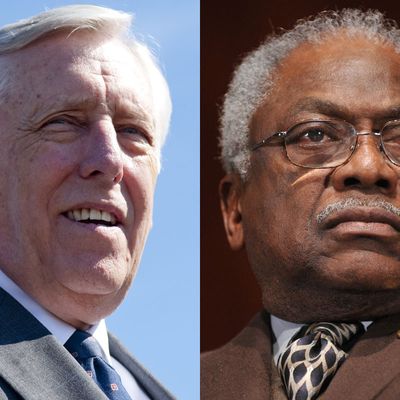
As support for gay marriage has increasingly become a mainstream position in the Democratic Party, it has begun to feel as if President Obama — whose so-called “evolution” on the issue may finally culminate as early as this afternoon in an interview with Good Morning America’s Robin Roberts — is one of the last major holdouts. After all, some of the Democratic Party’s most prominent names, such as Bill Clinton, Al Gore, John Kerry, Howard Dean, and Jimmy Carter, have come out in support of gay marriage over just the past few years.
But Obama is hardly the only party leader who has yet to make the leap. Hillary Clinton, the nation’s most popular politician, Democrat or otherwise, and a rumored 2016 candidate for president, hasn’t quite endorsed gay marriage, despite applauding the passage of marriage equality in New York last year. Senate Majority Leader Harry Reid doesn’t support gay marriage either — his spokesman said in 2009 that Reid “agrees with his church that marriage is between a man and a woman.” Senate President Pro Tempore Daniel Inouye of Hawaii — who, owing to one of the Constitution’s hilarious quirks, is third in line for the presidency — also favors “domestic unions,” according to his website. Then there’s the curious case of the House of Representatives’ second- and third-ranking Democrats, Maryland’s Steny Hoyer and South Carolina’s James Clyburn.
In 1996, Hoyer, now the House minority whip, voted for the Defense of Marriage Act, and in 2004, he said on the House floor that he supports “the traditional definition of marriage as a union between a man and a woman.” But that was eight years ago. Does he still? We tried to find out, but it appears as if Hoyer’s office wants to keep his beliefs vague. His communications director, Katie Grant, e-mailed us two quotes: The first was from a press conference this week, in which Hoyer says, “My own view is that we ought to treat everybody fairly and equally.” Which is hardly enlightening; that description could apply to civil unions as well as gay marriages. The other quote was from an MSNBC interview in February, in which Hoyer posits that President Obama would applaud Maryland’s passage of a marriage equality law. Again, doesn’t tell us much about where Hoyer stands. We pressed Grant for clarification on whether Hoyer supports gay marriage, and she declined.
The office of James Clyburn, the third-ranking member of the House Democrats, was even less forthcoming. Over the course of three days, we left numerous e-mail and voice messages for Clyburn’s spokesman, asking for Clyburn’s position on gay marriage. We never heard back. Christine Johnson, the executive director of South Carolina Equality, told us that her organization was unable to find any evidence that Clyburn has ever taken a position on the issue one way or the other.
Both Hoyer and Clyburn, either for personal or political reasons, would seemingly prefer to keep their position on this issue hazy and unknowable. Perhaps Hoyer, a Baptist, doesn’t want to broadcast that his beliefs concerning gay marriage now lag behind much of the party he helps to lead in the House. As for Clyburn, his district is 55 percent African-American, and Johnson notes that “it’s more difficult to get the African-American community supportive of marriage equality” in South Carolina. But as the ceaseless pressure on Obama has shown, steadfast ambiguity on marriage equality is becoming more and more untenable.





























